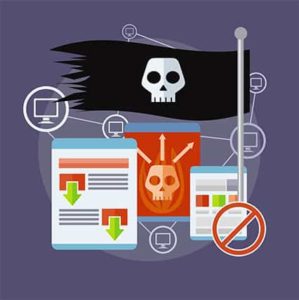Most of the time, the content that people download from torrent sites is copyrighted. And that is a big problem—or so copyright protection groups want you to believe.
There is little doubt about the fact that an overwhelming percentage of online users know stealing is wrong.
Yet, over 70% of people don’t consider piracy as stealing. And that’s why 22% (out of 5 KB of transferred data every 1 KB) of total internet bandwidth gets used for downloading copyrighted material.

Copyright groups argue that this doesn’t change the fact that pirating is stealing. But is it really? If someone steals a car, does that equate to stealing a movie? It would be hard not to argue against such a situation—stealing is stealing no matter the value of the stolen product.
This is important:
Downloading even a two-minute mp3 file from YouTube for offline viewing can infringe on the copyright protections of the producer of that file and the distributor of the product that comes with the file.But does that also hurt the artist or the producer behind the work?

Copyright groups would say so, arguing that copyright infringement hurts content creators and leads to around 750,000 job losses in America, according to a 2010 report from the U.S. Government Accountability Office.
However, the same report mentioned that such numbers could not be traced or substantiated to any methodology or data source. For all we know, copyright groups may be inflating the numbers. Still, that doesn’t mean pirating is harmless.
Generally speaking, piracy does decrease revenue for the entertainment industry. But due to the wide variety of inconsistent public data about this issue, some would argue that the problem might not meet the scale claimed by industry leaders and copyright groups. After all, one recent study found that the share of consumers who watch movies and TV shows illegally online decreased from 10% to 4% between 2016 and 2019.

Then, there is also the argument that if someone with little means to pay for premium content downloads a file from the internet for free, then is it really a lost sale for the producer of the content? Well, it all depends on the current situation of the producer and the downloader.
But one thing is for sure, to completely stop sites like RARBG from operating, the entertainment industry has to make their offerings competitive to discourage copyright infringement.


Pirating only takes away from residual income that often goes to the highest earners already. Crew makes hourly wages, while writers, directors, and some mega-star actors get residual income from ongoing sales and streaming of movies. These people are complaining that their monthly check is getting shorted. Unlike most of us who work and get paid since for the time we spend or capital we create, these people seem to think they’re owed a continual paycheck for doing something once. This is a flawed concept and needs to be addressed. Don’t let the millionaires who are losing a few hundred a week here and there tell you that you’re hurting them. If they really cared about all their ancillary crew and support staff, they’d give larger portions of their inflated salaries to those on the lowest end of the income spectrum to offset the minimal losses attributed to pirating.